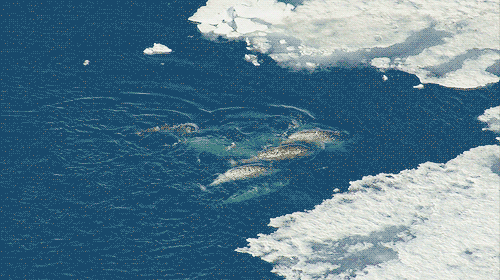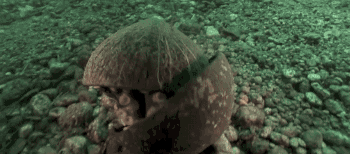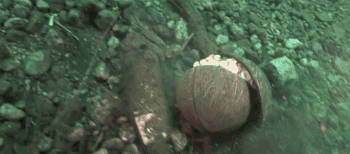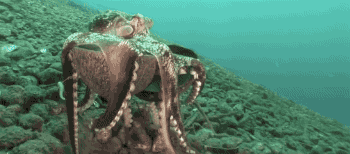Costa Rica’s Flag

Costa Rica’s flag
More Posts from Simplyphytoplankton and Others

IMG_2667 by scott1e2310 on Flickr.

To post about the miniature melo (Micromelo undatus) may seem a bit odd, as it is not a nudibranch but a closely-related sea snail! Its thinly-calcified shell is easily seen covering half of its back and is patterned with dazzling brown-red lines, a stark contrast to the blue, white-spotted body below. It lives in many tropic waters, whether that be Japan or Florida, and reaches about 3cm in length. It eats polychaete worms, and uses their toxins as its own.

Stunning Footage of Sperm Whales Attempting to Communicate With Freedivers Using Clicking Noises


What if we told you that a group of gelatinous animals helps control the planet’s climate? Your disbelief would be salp-able!
Salps are filter-feeding gelata related to pyrosomes that pack up plankton produce into poo pellets that precipitate into the deep, capturing carbon from the atmosphere and tucking it away in the depths of the hydrosphere.
Thanks to local photographers Michelle Manson and Joe Platko for the salp selfies! Joe’s photo on top shows a solitary Pegea confoederata ready to birth the same kind of long chain that Michelle found in her lower photo!
(The pink orbs are the salps’ guts, and these tubular animals are essentially a passing pasta strainer for plankton!)

These people not only vote, they’re the same ones paying $$$ to promote pro-fossil fuel candidates.
I honestly see it as no exaggeration to say that the fate of the planet rests on how - and if - we vote.
One Month
One month down
Cultural differences
Language barrier
On Friday, my first month in Costa Rica ended and marked the beginning of my second month here. Over the course of this month, I have noticed a lot of differences between Costa Rican culture and U.S. culture, although there are probably more that I have not noticed because I have not thought about them. Personal space and your personal bubble do not exist in the way they do in the U.S. It is common to hug and kiss people on the cheek as a sign of greeting and farewell, which as someone who likes their personal bubble, is taking a bit of time to get used to. It is very common for men to catcall, whistle, honk their horns, and stare at women walking, although every time that I have seen it, that's all it was. It makes me think that instead of men just lacking in all forms of self control, it is more of a cultural norm to do it and it would be out of place for men not to do it. Although, it still makes my female friends from the U.S. very uncomfortable for obvious reasons. Rules of the road really just seem like suggestions and it seems that drivers make up their own rules as they go, including motorcycles and scooters that always pass cars, buses, trucks, SUVs, etc... when they shouldn't. Most classes at the university are only once a week and there is a lot less busy work and a lot more group work. It is acceptable for people to show up late for classes and events (tico time), however, it does not apply to my science classes.
By far, my biggest struggle has been the language barrier. Looking back at a month ago, I can tell that there has been at least a subtle increase in my proficiency with Spanish. I try to listen and follow my professors, my parents, and other people that I encounter, but at times I can't understand what they are saying, although my listening skills are still a lot better than my speaking skills. I try to talk as much as possible but my problems are when I don't a word I need and cannot get around (although today I had a conversation about my opinion genetic modification with classmates for fun and it went really well) and if I don't have anything to say, I usually don't say anything. To mediate this, I've tried to force myself to talk more with mixed success. But I have learned that even if I understand 95% of what everyone says, the only way my speaking will improve is if I speak as much as I possibly can, knowing that I will make a lot of mistakes in the beginning.



Adjustments to a different educational landscape
Different systems
Less work
Difficulties
I thought it would be appropriate to write about the different educational landscape after taking my first round of exams for a number of reasons. First, it gives me enough time to adjust (kind of) to the different system, and secondly, it gives me a bit of time to reflect on the system as well.
I'll begin with a brief description outlining different education system. First, most students do not live on campus. Some may live two or three hours away too, which makes me feel awkward when I say I live on campus because the two hour is too long to do two times every day. Second, most classes are only once a week, which can make it easy to forget about work and procrastinate. In fact, my only class that is two times a week is my Spanish class taught by a professor with IFSA-Butler.
In my classes, there is a lot less "busy work," which is bitter sweet for me since busy work helps me stay on top of content but at the same time reduces free time. This also translate into less exams. In each of my three classes that have exams, there are only two. There is a lot of group work, usually including presentations, but in one of my biology labs, it means a lot of lab/field work. In the same course, called Evaluation of Habitat, we had two weekend trips (one to a refuge and one to a biological reserve) to complete small, independent projects.
Adjusting to this new academic system is difficult, especially with the language barrier. I also think that since there fewer numbers of classes every week, it is a lot harder to get a feel for each professor. It is difficult for me to point to few particular skills that I gained during my first year of college that I have used here because for me, I always need to experience it for myself and then I find my footing. It is hard to do it quickly, but I think that the best way for me to make the transition is to simply immerse myself in the system and my work.
IFSA-Butler's main role, especially during orientation, was giving advice to all of us and letting us know that they are there to provide support to us, including offering free tutoring to anyone who wanted it.

- Shadows of the ocean.🐋 Photo: @itookthisphotograph #oceanfilmtour #oceanlovers #underwaterphoto #whale #oceanlife #marinelife #ocean




Blog dedicted to phytoplankton. Phytoplankton are microscopic organisms that are responsible for half of the photosynthesis that occurs on Earth. Oh, and they look like art... Follow to learn more about these amazing litter critters! Caution: Will share other ocean science posts!Run by an oceanographer and phytoplankton expert. Currently a postdoctoral researcher.Profile image: False Colored SEM image of Emiliania huxleyi, a coccolithophore, and the subject of my doctoral work. Credit: Steve Gschmeissner/ Science Photo Library/ Getty ImagesHeader image: Satellite image of a phytoplankton bloom off the Alaskan Coast, in the Chukchi SeaCredit: NASA image by Norman Kuring/NASA's Ocean Color Web https://earthobservatory.nasa.gov/images/92412/churning-in-the-chukchi-sea
158 posts